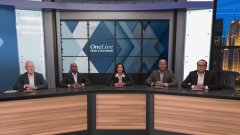
The SONIA Trial: Exploring CDK4/6 Inhibitor Efficacy in the First- and Second-Line Settings
Gregory Vidal, MD, PhD, presents ASCO 2023 data from the SONIA trial, which assessed the efficacy of CDK4/6 inhibitors when given as part of a combination with endocrine therapy (ET) in either the first- or second-line setting.
Episodes in this series

Transcript:
Komal Jhaveri, MD, FACP: One of the interesting data sets that were presented today, actually, were very, very provocative. Very nice question. A very academically designed study, which I think was very helpful. Certainly, when it was designed, [it’s] very, very important to address. I would love to hear your thoughts, Greg, about the phase 3 SONIA trial [NCT03425838] from our Dutch colleagues that was presented today.
Gregory Vidal, MD, PhD: I think it’s a very important study for many reasons [and for] cost reasons. Also, we’ve thought about this, and this study is a study that [randomly assigned] patients to start it in the first-line setting with antihormonal therapy; that is, an AI [aromatase inhibitor] with palbociclib vs AI by itself. In the second-line setting, on progression, switch to fulvestrant by itself, if you got CDK4/6 in the first line, [and] to fulvestrant and palbociclib in the second line, looking at PFS2 [progression-free survival 2] as the primary end point. In summary, there really wasn’t a difference in PFS2. There wasn’t a difference in overall survival, which would suggest you could use CDK4/6 inhibitors in any setting, frontline or second-line setting. You have very similar outcomes. There was a cost analysis that showed that you saved almost $200,000 because at the end of the day, you actually use less CDK4/6 if you did it in the second line because the benefit is less there.
However, I think the issue with the study is that the second-line treatment post CDK4/6 is probably not what most of us are doing, fulvestrant by itself. We’ve had numerous trials post CDK4/6…where fulvestrant is not behaving well. Three months progression-free survival. We all, at least I do consistently in the second line setting, use a combination strategy there. So that I don’t think was the best second-line drug. So there is still the question of whether or not you’d use CDK4/6 plus AI and then use a combination strategy in the second line, whether we would’ve seen an advantage for first line. I think this question is still not answered. There is lots and lots of evidence, including overall survival for first-line treatment. Although there is for second line, but first-line CDK4/6 patients are living longer; 7 years passed after first-line treatment. I would think for some countries, especially in Europe where cost is an issue, that may be truly beneficial. I will certainly consider it for some patients, but I think for now until we get more data, [I will] probably lean toward starting most of mine in the first line.
Komal Jhaveri, MD, FACP: Thank you. I think that was a very important question as we said at that time. I do think that I agree with you given the unprecedented overall survival benefit, [with] the trial using palbociclib we’re talking about, using the different CDK4/6 inhibitor, we’re trying to shy away from single-agent fulvestrant. It makes things very complicated. It just speaks to the fact how dynamically this field is evolving. There’s so much more to keep learning from this experience because questions that are relevant today might evolve and not necessarily address what we want to address 2 years from now.
Timothy Pluard, MD: We don’t know. Just in that trial, we don’t know coming off first-line AI, what was the incidence of ESR1 mutations in that population.
Komal Jhaveri, MD, FACP: And how would that impact?
Timothy Pluard, MD: Moving forward, when we have drugs that are now targeting ESR1, would that outcome be different?
Komal Jhaveri, MD, FACP: Right. Such an excellent point.
Transcript edited for clarity.
Clinicians referring a patient to MSK can do so by visiting msk.org/refer, emailing referapatient@mskcc.org, or by calling 833-315-2722.







































